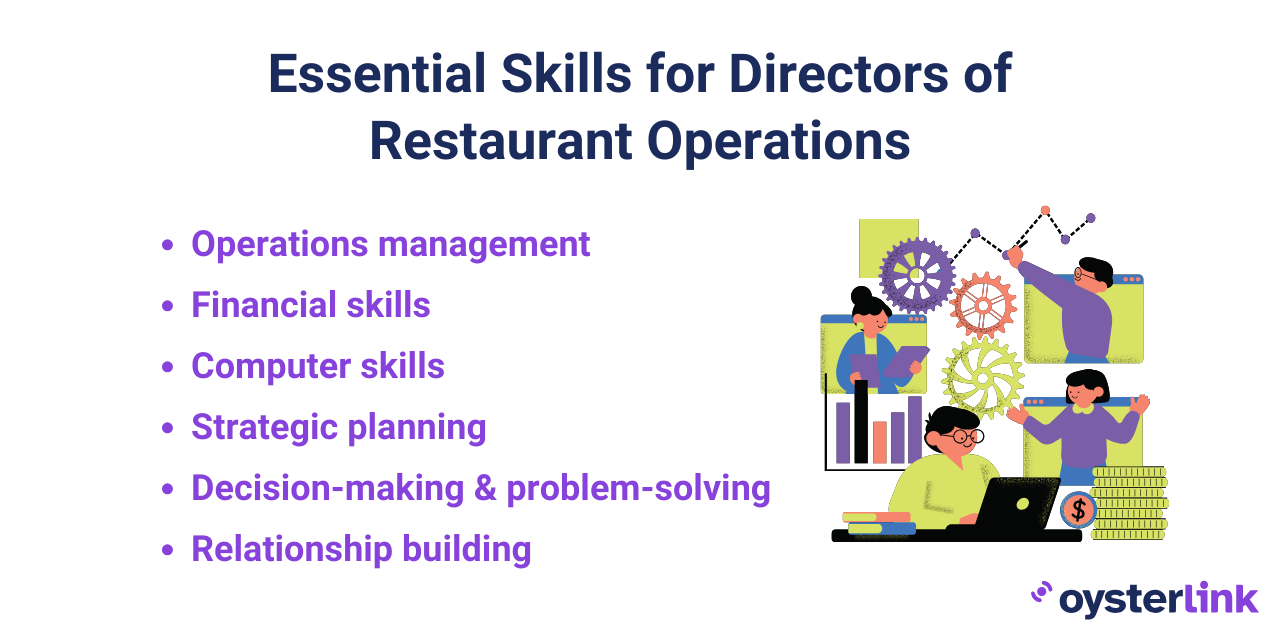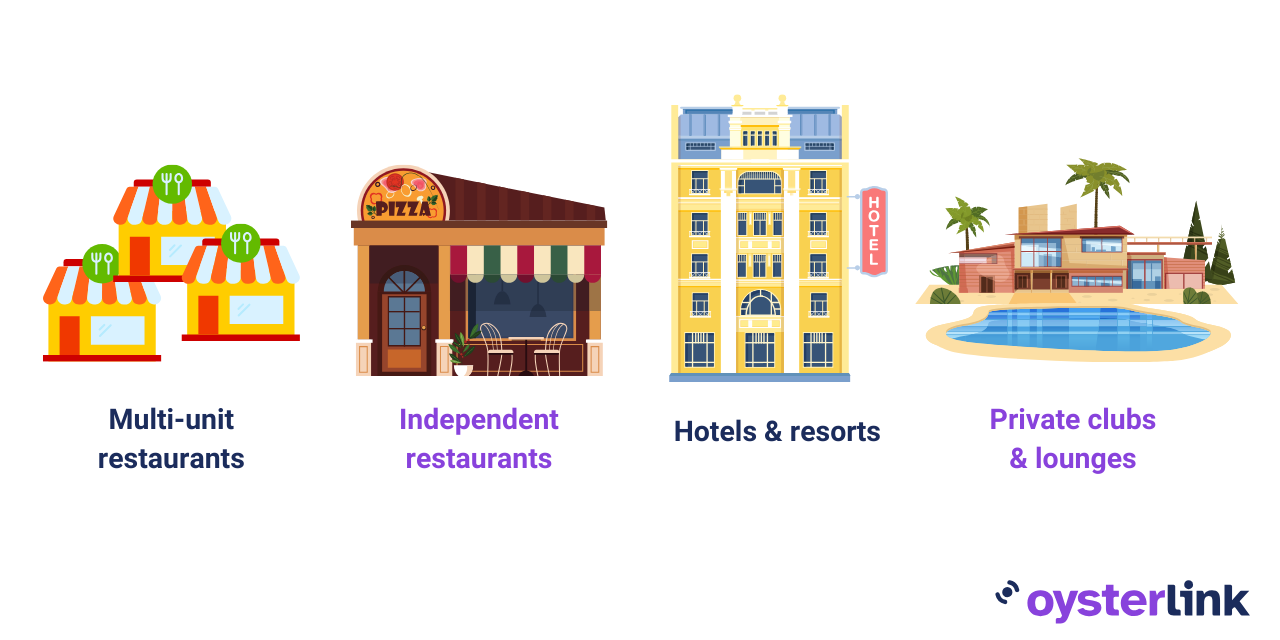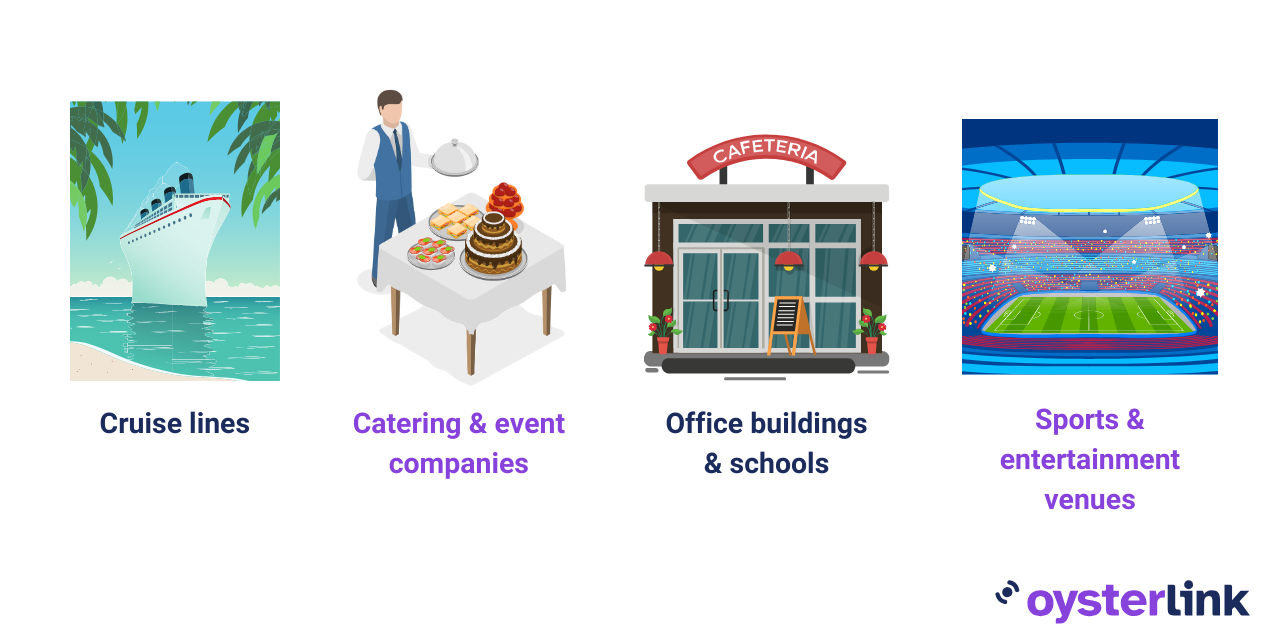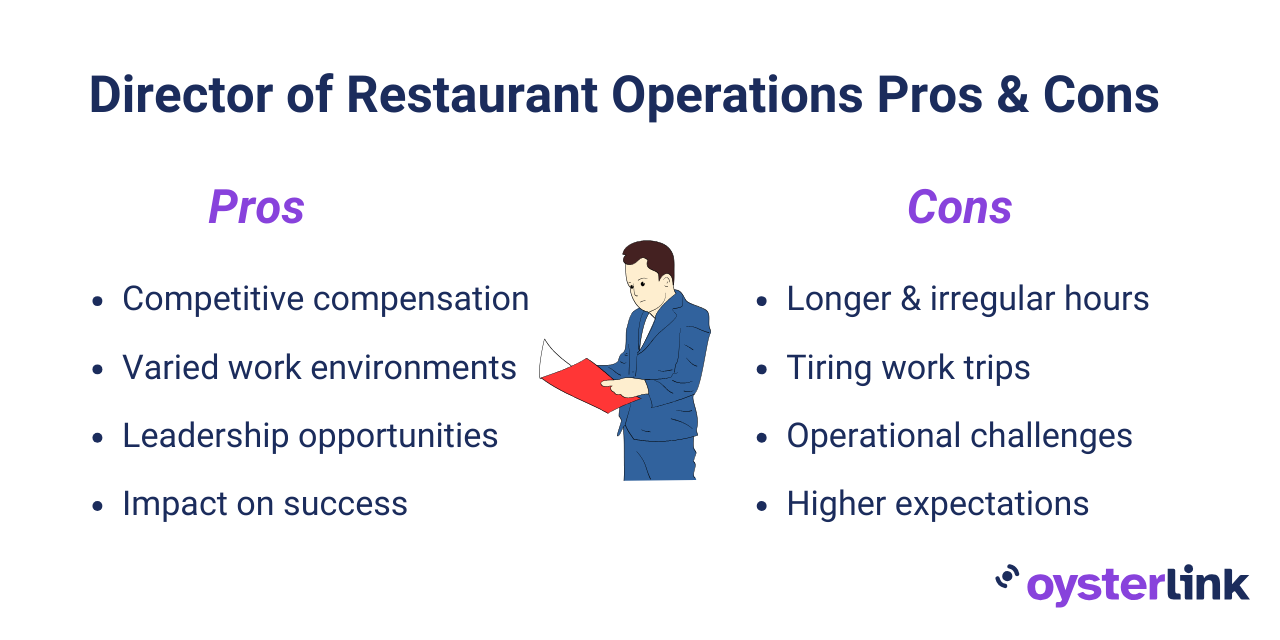For those working in the hospitality industry, Director of Restaurant Operations is one of the highest-level positions you can aim for.
Not sure where and how to begin? Fret not because we’ve put together this Director of Restaurant Operations Career Guide.
Keep reading for valuable insights into this role — including responsibilities, essential skills, career progression, salary trends and more.
What’s a Director of Restaurant Operations?
A Director of Restaurant Operations manages a company or establishment’s strategic and operational aspects — from financial management and process improvements to menu development and customer service.
This senior management role supervises various teams to optimize efficiency and maximize profitability. In some larger restaurant or hospitality companies, a Director of Restaurant Operations may be in charge of multiple dining establishments.
The typical alternative job titles for a Director of Restaurant Operations include: Food & Beverage (F&B) Director, Dining Services Director, Director of Food Services, Restaurant Operations Head and Director of Restaurants.
What Does a Director of Restaurant Operations Do?
The daily responsibilities of a Director of Restaurant Operations are:
- Improve efficiency and oversee operational processes and systems across all establishments
- Analyze financial performance — such as revenue margins, budgets and operating expenses — to ensure long-term profitability
- Spearhead strategies based on consumer and industry trends to achieve business objectives and growth
- Hire, train and evaluate staff members in every establishment, including managers
- Maintain and enhance customer satisfaction through service standards, feedback mechanisms and menu innovations or promotions
- Enforce health and safety protocols and guidelines to uphold the establishment’s reputation
- Work closely with Executive Chefs, Restaurant General Managers, Lead Bartenders and other staff members in developing or improving food and beverage offerings
- Lead contract negotiations and purchasing with suppliers and vendors
Top Skills for Directors of Restaurant Operations
To excel in their role, Directors of Restaurant Operations must develop and hone multiple skills that cover operational expertise and effective leadership qualities.

Below are the hard and soft skills you’ll need to thrive in your Director of Restaurant Operations career and help lead the company or establishment toward success.
1. Operations management
Directors of Restaurant Operations must have expertise in all aspects of restaurant operations. This includes (but isn’t limited to) inventory control, menu development, health and safety compliance and customer service.
Below is a video explaining the various aspects of restaurant operations.
Additionally, Directors of Restaurant Operations should constantly monitor and improve the company’s processes to ensure smooth operations and provide exceptional dining experiences for guests.
2. Financial skills
An effective Director of Restaurant Operations has superior financial acumen in order to help maximize a company or establishment’s profitability.
That said, they should know how to manage budgets, analyze profit and loss statements and implement cost-control measures. All these are necessarily
3. Computer skills
Proficiency in various restaurant software and data analysis tools is essential in effectively managing multiple aspects of restaurant operations.
These typically include point-of-sale (POS) systems, restaurant management software and data analysis tools like spreadsheets — all of which help Directors of Restaurant Operations stay organized and on top of their tasks.
4. Strategic planning
This skill set includes identifying opportunities for improvement, setting urgent priorities and long-term objectives and developing plans to achieve these.
As such, Directors of Restaurant Operations have to analyze market trends and assess the competition in order to strategically position the establishment for continual profitability and growth.
5. Decision-making and problem-solving skills
Similar to strategic planning, these skills are important for effective leadership. Directors of Restaurant Operations must be decisive and use critical thinking to make decisions that benefit the entire establishment or company.
That said, they should also be able to anticipate possible outcomes while navigating risks and uncertainties.
6. Relationship building
Directors of Restaurant Operations must establish and maintain strong professional relationships not only with their own staff, but also with suppliers, partner organizations, customers and those in top management.
Relationship building involves proper communication, active listening and effective collaboration to achieve common goals. It may also involve negotiation skills and conflict resolution whenever necessary.
How To Become a Director of Restaurant Operations
The road to becoming a Director of Restaurant Operations involves considerable preparation and dedication.
Below are the key points to help you reach this advanced-level position within the hospitality industry.
Education and Experience Requirements for Directors of Restaurant Operations
According to a survey conducted by the Occupational Information Network (O*NET), 29% require at least a high school diploma or equivalent from new hires for a Director of Restaurant Operations or similar position.
Meanwhile, 27% stated that a bachelor’s degree is required and 22% answered that some college, but no degree, is required.
[Source: O*NET]
This chart is interactive. Hover your mouse over different parts of the chart to see detailed data.
As for experience requirements, a Director of Restaurant Operations candidate must have previously held a managerial position within the hospitality industry. The minimum is usually between three and five years, but some employers may require more years.
How To Become a Director of Restaurant Operations With No Senior Managerial Experience
Want to apply for a Director of Restaurant Operations job but currently lack the experience needed? Consider taking these steps:
- Learn about the role: Gain a clear understanding of what a Director of Restaurant Operations does, including the role’s key responsibilities and pros and cons.
- Gain managerial experience: Work your way up by gaining experience from supervisory- and/or management-level jobs within the restaurant or hospitality industry. These may include working as a Restaurant Manager, a Lead Bartender, a Head Chef or other similar positions.
- Pursue opportunities for advancement: Seek advancement opportunities within your current workplace. Show initiative by asking your manager or employer about professional development programs and/or additional responsibilities you can handle.
- Determine your target area of expertise: Based on your current industry experience, identify the type of company or establishment where you would most prefer to work as a Director of Restaurant Operations. For example, would you rather work in an upscale restaurant group, a global fast-food chain or a hotel?
- Expand your professional network: Reach out to industry professionals with experience in restaurant operations leadership whom you can ask for advice or mentorship.
- Complete relevant training or education: Enroll in courses or certification programs related to restaurant operations or hospitality leadership. These would not only significantly boost your resume, but also equip you with the skills and knowledge you’ll need as a Director of Restaurant Operations.
Director of Restaurant Operations Certifications and Courses
Here are some of the organizations and institutions that offer top-quality courses or certification programs for Directors of Restaurant Operations.
| Organization/Institution | Certification/Course | Description |
|---|---|---|
| American Hotel & Lodging Educational Institute (AHLEI) | Certified Food and Beverage Executive | A specialized certification for management- or executive-level professionals in F&B or culinary operations |
| ServSuccess | Certified Restaurant Manager | Focuses on fundamental skills needed to be an effective Director of Restaurant Operations, such as staff management, marketing strategy, purchasing and cost control |
| Cornell University (via eCornell) | Hospitality Leadership | An online certificate program catered to senior-leadership employees; covers organizational strategy and industry trends and includes networking sessions |
| Università Bocconi (via Coursera) | Food & Beverage Management Course | An online course with certification ideal for aspiring Directors of Restaurant Operations looking to enhance their food marketing skills |
| Northwestern University – Kellogg School of Management | Operations Strategy Executive Program | A three-day, on-site program geared towards senior-level employees in charge of strategy and operations |
Salary & Earning Potential of Directors of Restaurant Operations
According to the latest data averaged from Talent.com, ZipRecruiter and Glassdoor, Directors of Restaurant Operations in the U.S. earn an average salary of $102,697 per year.
However, their individual earning potential mainly depends on the part of the country where they work. This is because each state has its own average salary for Directors of Restaurant Operations — as shown in the map below.
[Calculated using Indeed, Salary.com and ZipRecruiter data]
This map is interactive. Hover your mouse over different parts of the map to see detailed data.
The overall earnings of a Director of Restaurant Operations may also vary based on their level of managerial experience, their scope of responsibilities and the monetary incentives they receive.
Head to our Director of Restaurant Operations Salary page for more in-depth information.
Director of Restaurant Operations Career Progression
As mentioned earlier, those aiming to become a Director of Restaurant Operations must first excel in other managerial roles within the hospitality industry.
Here is a video outlining the effective strategies on how to go from a Manager to a Director.
On the other hand, those currently working as a Director of Restaurant Operations can advance to higher-level leadership roles within the hospitality industry. Examples of these include Regional Operations Director, Chief Operating Officer and Vice President of Operations.
The video below provides insights on how to progress from a Director to a VP and other similar positions.
Overall, the role of Director of Restaurant Operations may serve as both a hospitality career goal and a stepping stone toward more senior executive positions within the industry. It all depends on a professional’s long-term goals and preferred career trajectory.
What Is the Workplace of a Director of Restaurant Operations Like?
The workplace of a Director of Restaurant Operations depends on the type of company or establishment in which they are employed.

In multi-unit restaurants, they oversee multiple locations within their assigned area, ensuring adherence to operational procedures, brand standards and customer service protocols. Multi-unit restaurants range from fast-food and cafe chains to bistros and fine-dining restaurants.
On the other hand, independent restaurants such as neighborhood eateries and family-owned diners are typically single-location establishments with relatively more flexible procedures and personalized customer service. Here, Directors of Restaurant Operations may work closely with owners to handle day-to-day operations.
In hotels and resorts, they manage the food and beverage operations of either an entire property or multiple ones. F&B operations include restaurants and bars that often specialize in specific cuisines and culinary styles. Additionally, F&B operations cover room service, banquets, buffets and special events.
Private clubs and lounges usually give similar duties and responsibilities to the Director of Restaurant Operations as hotels and resorts. However, the clientele in these settings tends to be more exclusive.

Directors of Restaurant Operations working for cruise lines are in charge of the F&B operations for an entire ship. They oversee multiple dining and drinking venues, along with themed events and private meal services. Not to mention, Directors of Restaurant Operations here enjoy more travel opportunities.
Similarly, Directors of Restaurant Operations in catering and event companies may get to travel more often, especially if the company has clients in multiple states. In this work setting, Directors of Restaurant Operations streamline catering operations for optimal efficiency. They also collaborate with the Event Manager to ensure that the overall dining experience meets the client’s expectations.
In office buildings and educational institutions, a Director of Restaurant Operations manages in-house dining facilities like cafeterias. Given that they have a regular set of customers here, it would be good for Directors of Restaurant Operations to be more proactive in aligning the daily menu with customers’ dietary preferences and nutritional needs.
Sports and entertainment venues hire Directors of Restaurant Operations to oversee concessions, catering services and even VIP services. They may also have a more varied schedule, depending on factors like the season of a sports league and the tour dates of popular performers.
Director of Restaurant Operations Career: Pros & Cons
Here’s a rundown of the advantages and challenges that you’ll likely encounter while working as a Director of Restaurant Operations.
Pros:
- Competitive compensation: Directors of Restaurant Operations have a high-level role, so they generally receive higher pay and more comprehensive benefits.
- Varied work environments: Directors of Restaurant Operations get to work on different sites, especially if they oversee operations for multiple stores. Additionally, those working for big-name hotels, restaurant chains, cruise lines and similar companies often split their time between the corporate office and the actual establishment.
- Leadership opportunities: The role of a Director of Restaurant Operations involves managing different employees, from Restaurant Managers and Head Chefs to Servers and Line Cooks. That said, they have various leadership opportunities that allow them to make a significant impact on their team members’ careers.
- Impact on success: Being a Director of Restaurant Operations can be a rewarding job, given the responsibilities that could contribute to the overall success of a business. Examples of these responsibilities are spearheading sales strategies, monitoring financial performance and setting guidelines to ensure customer satisfaction.

- Long and irregular hours: Directors of Restaurant Operations tend to have longer and varied work schedules, which may include late evenings, weekends and holidays.
- Tiring trips: Being a Director of Restaurant Operations may entail constant traveling – both short- and long-distance — which takes a lot of time and energy.
- Operational challenges: Directors of Restaurant Operations must always anticipate and solve various operational challenges such as fluctuating food costs and staffing shortages. That said, they normally experience high stress levels while navigating such challenges.
- Higher expectations: Given the amount and weight of their responsibilities, Directors of Restaurant Operations are under constant pressure to meet or exceed goals.
Quiz: Is Director of Restaurant Operations the Right Role for You?
Our quiz below will help you figure out whether you have what it takes to be a Director of Restaurant Operations.
Results
Congratulations!
Based on your responses, it looks like a career as a Director of Restaurant Operations could be an excellent fit for you. Your skills and preferences align well with the demands of the role.
Embrace this opportunity and consider gaining further education and hands-on experience to enhance your leadership abilities. Visit our Director of Restaurant Operations Career page for more info.
Here’s to a promising future in restaurant operations management!
There’s great potential!
While the quiz results suggest that a Director of Restaurant Operations role may not be an immediate perfect match, there’s ample opportunity for growth and success with commitment and focused effort.
Consider investing time in honing your leadership skills, perhaps by taking courses or gaining more experience in restaurant operations management. You can also visit our Director of Restaurant Operations Career page to learn more about what this dynamic role entails and how you can improve your chances.
#1. There has been a decrease in customer satisfaction ratings across all restaurant locations. How would you address this issue?
#2. What would you do if your main competitor recently launched a new menu item that is gaining significant hype among consumers?
#3. The restaurant group is planning to open a new store in a different city. How would you ensure a successful expansion process?
#4. How do you feel about utilizing software and tools for restaurant operations?
#5. How would you address a decline in revenue across multiple stores over the past few months?
#6. How would you resolve a consistent lack of coordination between front-of-house and back-of-house staff?
#7. What would you do if the restaurant received a low health inspection score due to sanitation violations?
#8. How do you develop cost-reduction strategies to address a decline in the restaurant’s profit margins?
#9. A Restaurant General Manager notified you about a decline in staff morale and job satisfaction across multiple stores. How would you help address this problem?
#10. Do you think staying updated on the latest restaurant industry trends contributes to improving operations?
Director of Restaurant Operations Career FAQ
Restaurant operations refers to the overall management of a dining establishment, ensuring that it runs as effectively and efficiently as possible. It covers a wide range of day-to-day tasks such as:
- Managing inventory for ingredients, supplies and equipment
- Monitoring, analyzing and controlling finances to maximize profitability
- Overseeing the preparation of all menu items
- Maintaining facilities and equipment in optimal condition
- Adhering to federal, state and local health and safety regulations
- Providing exceptional customer service
- Hiring, training and evaluating front-of-house and back-of-house staff and ensuring coordination among both staff
Hence, it is also the job of a Director of Restaurant Operations to lead and supervise all employees who will be implementing the particular tasks above.
It depends on the company or establishment they work for.
Directors of Restaurant Operations working for big-name restaurant chains, hotels, cruise lines and similar organizations typically split their time between the corporate office and the actual store.
In contrast, Directors of Restaurant Operations of single-unit restaurants typically spend most of their work hours inside the establishment.
This depends on the company or establishment you’re applying for.
Some may highly prefer or require their Director of Restaurant Operations to have a culinary background.
Others may prefer candidates who have previously worked as a Restaurant Manager or equivalent.
It depends on the organizational structure of the company or establishment.
In most restaurants, Directors of Restaurant Operations are of a higher rank than Restaurant General Managers. However, in most hotels or resorts, the Director of Restaurant Operations (or equivalent) reports directly to the Hotel General Manager.
That said, it’s best to check or clarify the organizational structure during your interview for a Director of Restaurant Operations job.
Not necessarily. In some larger companies, the Director of Restaurant Operations (or equivalent) reports to the Operations Director and/or the Chief Operating Officer.


